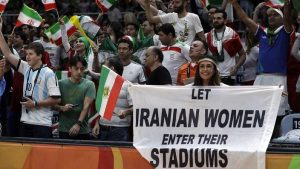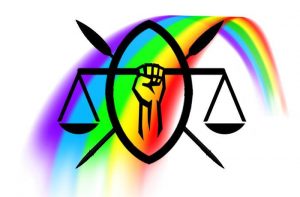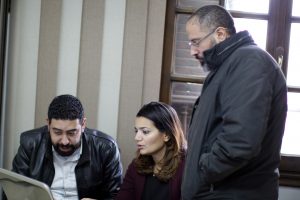28 Mar 2018 | Awards, Fellowship 2018, News
[vc_row][vc_column][vc_video link=”https://youtu.be/eqJSvqcp968″][vc_column_text]The women behind Open Stadiums risk their lives to assert women’s rights to attend public sporting events in Iran. It’s a daring campaign which challenges the established Islamic order of Iran, and engages women in an issue many human rights activists have not in the past thought important.

Currently in Iran women face many restrictions on using public space. Swimming pools, schools, sports hall and even parks are gender segregated.
But the most potent example of their banishment from public life is that they are prohibited from going to popular sporting fixtures where men compete.
One of the successes of the Open Stadiums campaign has been to build the awareness of this as an issue.
Iran particularly enjoys competing in, and hosting international football and volleyball tournaments, and the Open Stadiums campaign has used Iran’s desire to take part in international competition to challenge the government’s ban on women attending events. In theory international sporting bodies do not allow member nations to use discriminatory practices during matches.
The campaigners face many difficulties. The organisers are worried that as their campaign becomes more successful, they will be identified and tracked. They cannot expand their campaign because they fear any foreign funds they receive will lead to then being identified and jailed, as the Iranian government continues to stifle dissent of any kind. The Iranian regime has a history of putting women’s rights activists under pressure.
Despite the difficulties and fears, 2017 has been a successful year for the Open Stadiums campaign. But the success of the group has put them increasingly in the spotlight and therefore heightened the risk for them.
 In May, the group used the slight easing of restrictions on public debate during the presidential election campaign to publish 21 demands for women and specifically pushed for women to be able to use public spaces and go to stadiums.
In May, the group used the slight easing of restrictions on public debate during the presidential election campaign to publish 21 demands for women and specifically pushed for women to be able to use public spaces and go to stadiums.
In September, the world’s media covered the fact women, despite having tickets, were refused entry to the football world cup qualifier between Syria and Iran in Tehran.
Two things this year have changed according to Open Stadiums. First, men and women in every match now complain about the ban on women at stadiums. They have been made to feel aware of the discrimination and it is talked about it a lot on social media. Second, MPs and people in power are beginning to talk about women’s rights to attend sports events in a way that would have been taboo before.
“I was happy down in my heart, especially when I read about the other nominees,” said Open Stadiums. “They were such great campaigns and people. I hadn’t heard of them before, and it was amazing to see how many individuals in this world are doing works not for more money but for better days for other people and society. This nomination gave me strength – yesterday when I was at risk of being arrested, I was thinking if i get arrested i know some people at least know about my passion and works i did these years.”
See the full shortlist for Index on Censorship’s Freedom of Expression Awards 2018 here.[/vc_column_text][/vc_column][/vc_row][vc_row full_width=”stretch_row_content” equal_height=”yes” el_class=”text_white” css=”.vc_custom_1490258749071{background-color: #cb3000 !important;}”][vc_column width=”1/2″][vc_custom_heading text=”Support the Index Fellowship.” font_container=”tag:p|font_size:28|text_align:center” use_theme_fonts=”yes” link=”url:https%3A%2F%2Fwww.indexoncensorship.org%2Fsupport-the-freedom-of-expression-awards%2F|||”][vc_column_text]
By donating to the Freedom of Expression Awards you help us support
individuals and groups at the forefront of tackling censorship.
Find out more
[/vc_column_text][/vc_column][vc_column width=”1/2″ css=”.vc_custom_1521479845471{background-image: url(https://www.indexoncensorship.org/wp-content/uploads/2017/05/2017-awards-fellows-1460×490-2_revised.jpg?id=90090) !important;background-position: center !important;background-repeat: no-repeat !important;background-size: cover !important;}”][/vc_column][/vc_row][vc_row][vc_column][vc_basic_grid post_type=”post” max_items=”4″ element_width=”6″ grid_id=”vc_gid:1522067393647-a5588697-4f78-2″ taxonomies=”10735″][/vc_column][/vc_row]
27 Mar 2018 | Events
[vc_row][vc_column][vc_column_text]Doughty Street International’s Media Defence Panel invites you to join a breakfast seminar on freedom of expression and the protection of journalists and human rights activists in Egypt. Hosted in association with Index on Censorship, we will be joined by a representative of the Egyptian Commission for Rights and Freedoms, Egypt (ECRF), nominees for this year’s Index on Censorship Freedom of Expression Award for Campaigning.
ECRF is one of the few human rights organisations still operating in Egypt. It provides advocacy, legal support and campaigning expertise to draw attention to human rights abuses taking place under the rule of President Abdel Fattah-el-Sisi. ECRF plays an important role in documenting cases of enforced disappearance and arrests during protests, which are not reported in the heavily censored local media, and in providing legal help for the families of those detained and disappeared. Twice last year ECRF’s headquarters was raided by security forces and two staff members were arrested.
ECRF says: “Our main goal to achieve in the future, which is stated in our mission, is to empower individuals to acquire their rights, promote a culture of democracy in the Egyptian society, and expand human rights to every home in Egypt.”
The seminar will involve a panel and roundtable discussion, including a representative of ECRF; Jodie Ginsberg, Index on Censorship; and Jeremy Dear, Deputy General Secretary of the International Federation of Journalists.[/vc_column_text][vc_row_inner][vc_column_inner width=”1/3″][vc_single_image image=”74586″ img_size=”full” alignment=”center”][/vc_column_inner][vc_column_inner width=”1/3″][vc_single_image image=”99393″ alignment=”center”][/vc_column_inner][vc_column_inner width=”1/3″][vc_single_image image=”97988″][/vc_column_inner][/vc_row_inner][/vc_column][/vc_row][vc_row][vc_column][vc_column_text]
When: Tuesday 17 April 2018 8:15-9:45am
Where: Doughty Street Chambers, 54 Doughty Street, London WC1N2LS (Directions)
Tickets: Free. Registration required via Eventbrite.
[/vc_column_text][/vc_column][/vc_row]
27 Mar 2018 | Awards, Fellowship 2018, News
[vc_row][vc_column][vc_video link=”https://youtu.be/d-q_4RcHH_0″][vc_column_text]The National Gay and Lesbian Human Rights Commission (NGLHRC ) is the only organisation in Kenya — where homosexuality is still a criminal offence and attacks on the gay community frequent — using a legal route to challenge LGBTIQ discrimination.

Men who have sex with men in Kenya can be punished by up to 14 years in prison and, although there are no specific laws relating to women, Prime Minister Raila Odinga said in 2010 that women who have sex with women should also be imprisoned. LGBTIQ people also often find themselves subject to violence and blackmail.
NGLHRC was set up in 2012 by six young legal advocates, but its name was officially only recognised two years ago after a long court battle, which is still being appealed. Winning the right even to exist was, according to the International Service for Human Rights, a milestone for all charities campaigning for gay rights on the African continent.
The aim of the commission is to prevent discrimination on account of real or presumed sexual orientation and gender identity, and respond to discrimination when it happens.
The way they address this is by offering legal aid to Kenya’s LGBTIQ community across every city, town, rural area, and county whenever they are faced with discrimination, harassment and violence because of their sexual orientation or gender. They also offer training to public officials and judges.
The main challenge the NGLHRC faces is difficulties in reforming the laws and policies because of delays in court dates. The insensitive messages published by the media about LGBTIQ people is also, they argue, retrograde and increases stigma and violence.
 NGLHRC currently has three cases in court. Its aim is to achieve change by using litigation to ensure legal precedent. The first court case the commission is involved in is about ensuring its very survival: making sure the attorney general does not win a constitutional appeal against the registration of the commission.
NGLHRC currently has three cases in court. Its aim is to achieve change by using litigation to ensure legal precedent. The first court case the commission is involved in is about ensuring its very survival: making sure the attorney general does not win a constitutional appeal against the registration of the commission.
The second is to ensure the end of forced anal examinations which is common when a man is accused of having sex with another man.
And the third is to challenge the constitutionality of the penal code which criminalises homosexuality.
One of the biggest campaigning successes of the NGLHRC in the last year was when in September 2017. It won agreement from the Kenya Medical Association to stop forced anal examination of clients “even in the guise of discovering crimes.”
“Being nominated for an 2018 Freedom of Expression Award was quite unexpected,” said NGLHRC. “To be included with likes of so many activists, artists and organisations who are dedicated to the realisation of life-changing work is quite the honour. Many times in the quiet of each of our corners, doing the day to day work needed to make our communities better places, the work can feel isolated. Recognition of this kind reinforces that what the National Gay and Lesbian Human Rights Commission does matter.”
See the full shortlist for Index on Censorship’s Freedom of Expression Awards 2018 here.[/vc_column_text][/vc_column][/vc_row][vc_row full_width=”stretch_row_content” equal_height=”yes” el_class=”text_white” css=”.vc_custom_1490258749071{background-color: #cb3000 !important;}”][vc_column width=”1/2″][vc_custom_heading text=”Support the Index Fellowship.” font_container=”tag:p|font_size:28|text_align:center” use_theme_fonts=”yes” link=”url:https%3A%2F%2Fwww.indexoncensorship.org%2Fsupport-the-freedom-of-expression-awards%2F|||”][vc_column_text]
By donating to the Freedom of Expression Awards you help us support
individuals and groups at the forefront of tackling censorship.
Find out more
[/vc_column_text][/vc_column][vc_column width=”1/2″ css=”.vc_custom_1521479845471{background-image: url(https://www.indexoncensorship.org/wp-content/uploads/2017/05/2017-awards-fellows-1460×490-2_revised.jpg?id=90090) !important;background-position: center !important;background-repeat: no-repeat !important;background-size: cover !important;}”][/vc_column][/vc_row][vc_row][vc_column][vc_basic_grid post_type=”post” max_items=”4″ element_width=”6″ grid_id=”vc_gid:1522067231973-3405d213-874a-10″ taxonomies=”10735″][/vc_column][/vc_row]
26 Mar 2018 | Awards, Fellowship, Fellowship 2018, News
[vc_row][vc_column][vc_video link=”https://youtu.be/7kseuuaARZQ”][vc_column_text]The Egyptian Commission for Rights and Freedoms (ECRF) is one of the only human rights organisations still operating in a country increasingly hostile to dissent and in which countless civil society organisations have been forced to close. The commission coordinates campaigns for those who have been tortured or disappeared, as well as highlighting numerous incidences of human rights abuses.
“Our main goal to achieve in the future, which is stated in our mission, is to empower individuals to acquire their rights, promote a culture of democracy in the Egyptian society, and expand human rights to every home in Egypt,” ECRF told Index. “But in the end of the day we decide to carry out with our work regardless of the challenges because if everyone is silenced this would be the ultimate gain to the current regime, and the ultimate victory to Egypt’s state of fear.”
Between August 2016 and August 2017, the ECRF documented 378 cases of enforced disappearance many of whom were students. The cases of the disappeared are not reported in the heavily censored local media, and the commission’s website and social media sites are some of the few places their plight can be publicised, reported and mapped.
The highly restrictive and repressive environment Egypt has made it increasingly difficult for the organisation to do its work.
Their website was blocked in September in government measures designed to close the organisation down, but the ECRF managed to create a parallel website to maintain their presence and engagement with the public. Twice last year ECRF’s headquarters was raided by security forces with two staff members being arrested. As a result, the staff need help dealing with the risks of being arrested, as well as dealing with the interrogation process and knowing how to protect information.
Over the past 12 months the ECRF has been fighting censorship and defending human rights in two ways. The first is through the criminal justice programme which tackles issues of torture and enforced disappearances in Egypt. It has been particularly focused on the arrest of activists who took part in demonstrations against Egypt’s agreement to cede two uninhabited islands in the Red Sea to Saudi Arabia.

Secondly, ECRF has worked on challenging censorship imposed on student associations in universities. Recently the commission launched an online platform to bring students and practitioners online to discuss a student charter related to freedom of association in universities. The platform was heavily criticised by the ministry of higher education in Cairo, which led to further condemnation of it in official media outlets.
As a direct result of the work ECRF has carried out over the past year, there has been an increased awareness of enforced disappearances, media censorship, the scale of torture, and violations of freedom of association and expression in media and universities.
“ECRF is honored to be shortlisted alongside three peer organizations/campaigns also facing severe human rights challenges in their own countries,” said ECRF. “The international recognition of ECRF’s efforts in campaigning for fundamental freedoms emboldens its members and staff in their resilience to strive for human rights and democracy in Egypt. Regardless of the winner, progress towards equal rights in Russia means progress in Egypt and progress in Kenya means progress in Iran and vice-versa.”
See the full shortlist for Index on Censorship’s Freedom of Expression Awards 2018 here.[/vc_column_text][/vc_column][/vc_row][vc_row full_width=”stretch_row_content” equal_height=”yes” el_class=”text_white” css=”.vc_custom_1490258749071{background-color: #cb3000 !important;}”][vc_column width=”1/2″][vc_custom_heading text=”Support the Index Fellowship.” font_container=”tag:p|font_size:28|text_align:center” use_theme_fonts=”yes” link=”url:https%3A%2F%2Fwww.indexoncensorship.org%2Fsupport-the-freedom-of-expression-awards%2F|||”][vc_column_text]
By donating to the Freedom of Expression Awards you help us support
individuals and groups at the forefront of tackling censorship.
Find out more
[/vc_column_text][/vc_column][vc_column width=”1/2″ css=”.vc_custom_1521479845471{background-image: url(https://www.indexoncensorship.org/wp-content/uploads/2017/05/2017-awards-fellows-1460×490-2_revised.jpg?id=90090) !important;background-position: center !important;background-repeat: no-repeat !important;background-size: cover !important;}”][/vc_column][/vc_row][vc_row][vc_column][vc_basic_grid post_type=”post” max_items=”4″ element_width=”6″ grid_id=”vc_gid:1522065946315-a2955265-bb40-3″ taxonomies=”10735″][/vc_column][/vc_row]
 In May, the group used the slight easing of restrictions on public debate during the presidential election campaign to publish 21 demands for women and specifically pushed for women to be able to use public spaces and go to stadiums.
In May, the group used the slight easing of restrictions on public debate during the presidential election campaign to publish 21 demands for women and specifically pushed for women to be able to use public spaces and go to stadiums. 

 NGLHRC currently has three cases in court. Its aim is to achieve change by using litigation to ensure legal precedent. The first court case the commission is involved in is about ensuring its very survival: making sure the attorney general does not win a constitutional appeal against the registration of the commission.
NGLHRC currently has three cases in court. Its aim is to achieve change by using litigation to ensure legal precedent. The first court case the commission is involved in is about ensuring its very survival: making sure the attorney general does not win a constitutional appeal against the registration of the commission.